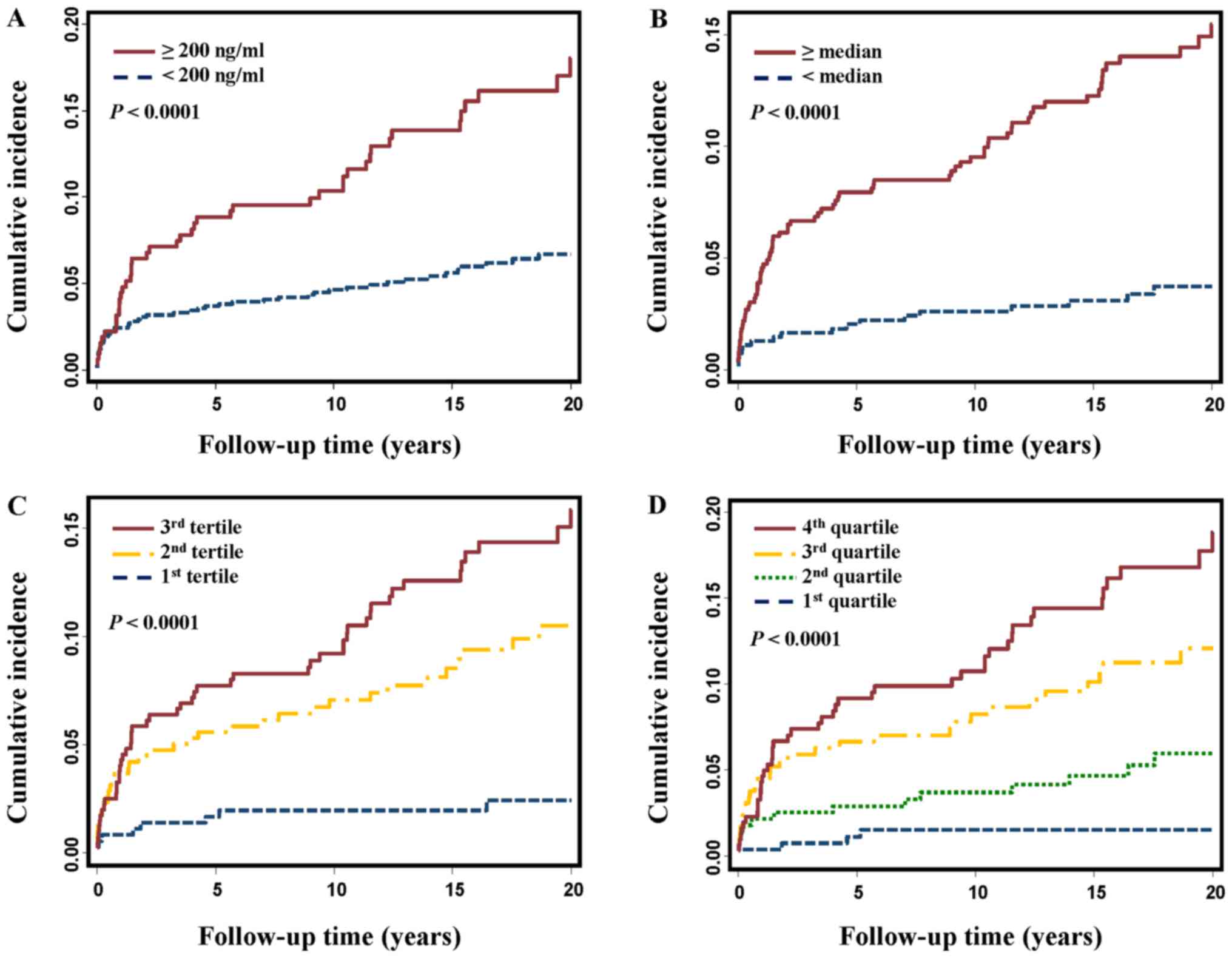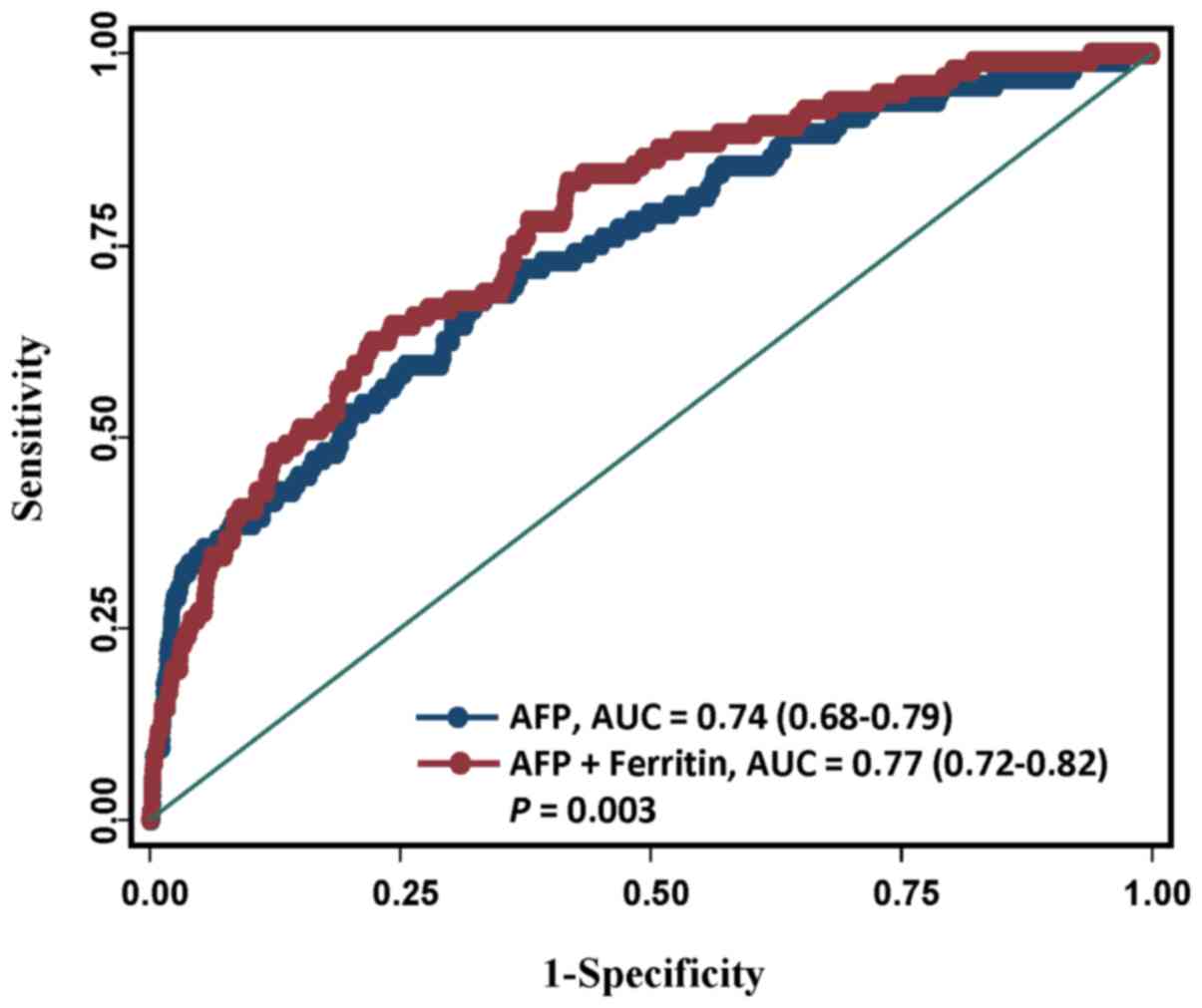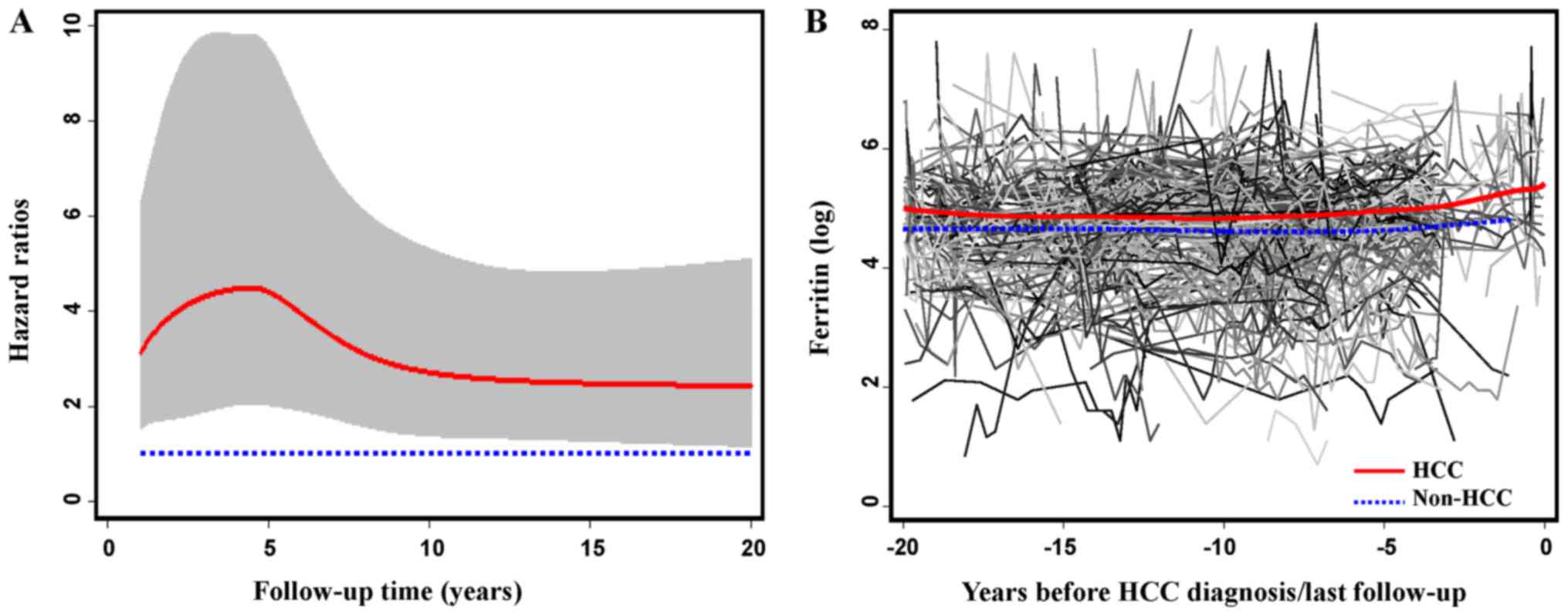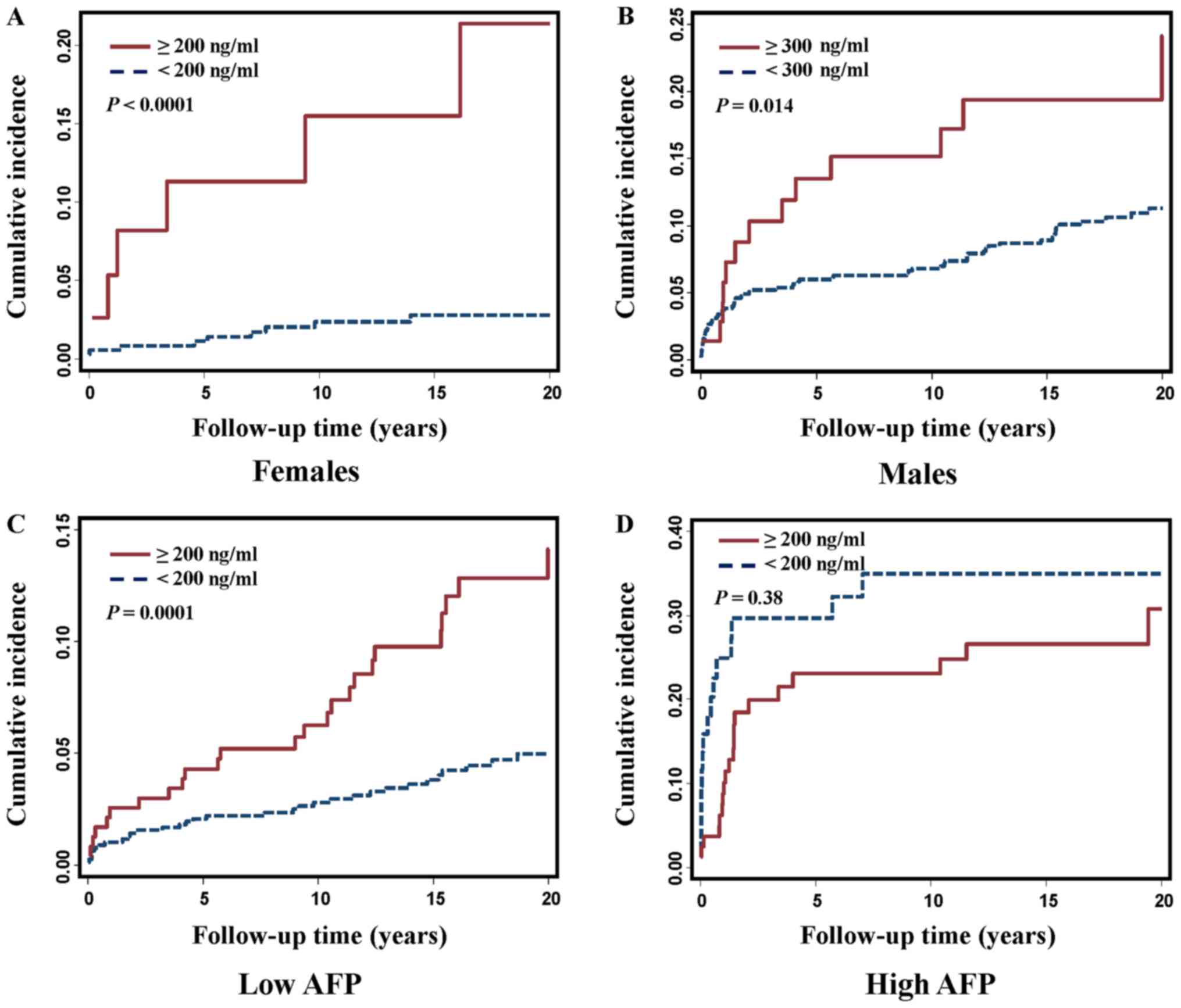|
1
|
Singal AG and El-Serag HB: Hepatocellular
carcinoma from epidemiology to prevention: Translating knowledge
into practice. Clin Gastroenterol Hepatol. 13:2140–2151. 2015.
View Article : Google Scholar : PubMed/NCBI
|
|
2
|
Fleming RE and Ponka P: Iron overload in
human disease. N Engl J Med. 366:348–359. 2012. View Article : Google Scholar : PubMed/NCBI
|
|
3
|
Hann HW, Stahlhut MW and Hann CL: Effect
of iron and desferoxamine on cell growth and in vitro ferritin
synthesis in human hepatoma cell lines. Hepatology. 11:566–569.
1990. View Article : Google Scholar : PubMed/NCBI
|
|
4
|
Schwarzenbach H, Müller V, Milde-Langosch
K, Steinbach B and Pantel K: Evaluation of cell-free tumour DNA and
RNA in patients with breast cancer and benign breast disease. Mol
Biosyst. 7:2848–2854. 2011. View Article : Google Scholar : PubMed/NCBI
|
|
5
|
Hann HW, Kim CY, London WT and Blumberg
BS: Increased serum ferritin in chronic liver disease: A risk
factor for primary hepatocellular carcinoma. Int J Cancer.
43:376–379. 1989. View Article : Google Scholar : PubMed/NCBI
|
|
6
|
Kowdley KV, Belt P, Wilson LA, Yeh MM,
Neuschwander-Tetri BA, Chalasani N, Sanyal AJ and Nelson JE: NASH
Clinical Research Network: Serum ferritin is an independent
predictor of histologic severity and advanced fibrosis in patients
with nonalcoholic fatty liver disease. Hepatology. 55:77–85. 2012.
View Article : Google Scholar : PubMed/NCBI
|
|
7
|
Nakano S, Kumada T, Sugiyama K, Watahiki H
and Takeda I: Clinical significance of serum ferritin determination
for hepatocellular carcinoma. Am J Gastroenterol. 79:623–627.
1984.PubMed/NCBI
|
|
8
|
Simonetti RG, Craxi A, Dardanonì G,
Lanzarone F, Barbaria F, Cottone M and Pagliaro L: The clinical
value of serum ferritin in hepatocellular carcinoma.
Hepatogastroenterology. 32:276–278. 1985.PubMed/NCBI
|
|
9
|
Tatsuta M, Yamamura H, Iishi H, Kasugai H
and Okuda S: Value of serum alpha-fetoprotein and ferritin in the
diagnosis of hepatocellular carcinoma. Oncology. 43:306–310. 1986.
View Article : Google Scholar : PubMed/NCBI
|
|
10
|
Stevens RG, Beasley RP and Blumberg BS:
Iron-binding proteins and risk of cancer in Taiwan. J Natl Cancer
Inst. 76:605–610. 1986. View Article : Google Scholar : PubMed/NCBI
|
|
11
|
Hann HW, Fu X, Myers RE, Hann RS, Wan S,
Kim SH, Au N, Xing J and Yang H: Predictive value of
alpha-fetoprotein in the long-term risk of developing
hepatocellular carcinoma in patients with hepatitis B virus
infection-results from a clinic-based longitudinal cohort. Eur J
Cancer. 48:2319–2327. 2012. View Article : Google Scholar : PubMed/NCBI
|
|
12
|
Fu X, Wan S, Hann HW, Myers RE, Hann RS,
Au J, Chen B, Xing J and Yang H: Relative telomere length: A novel
non-invasive biomarker for the risk of non-cirrhotic hepatocellular
carcinoma in patients with chronic hepatitis B infection. Eur J
Cancer. 48:1014–1022. 2012. View Article : Google Scholar : PubMed/NCBI
|
|
13
|
Adams P: Management of elevated serum
ferritin levels. Gastroenterol Hepatol (N Y). 4:333–334.
2008.PubMed/NCBI
|
|
14
|
Andersen PK, Geskus RB, de Witte T and
Putter H: Competing risks in epidemiology: Possibilities and
pitfalls. Int J Epidemiol. 41:861–870. 2012. View Article : Google Scholar : PubMed/NCBI
|
|
15
|
Royston P and Parmar MK: Flexible
parametric proportional-hazards and proportional-odds models for
censored survival data, with application to prognostic modelling
and estimation of treatment effects. Stat Med. 21:2175–2197. 2002.
View Article : Google Scholar : PubMed/NCBI
|
|
16
|
Hann HW, Wan S, Lai Y, Hann RS, Myers RE,
Patel F, Zhang K, Ye Z, Wang C and Yang H: Aspartate
aminotransferase to platelet ratio index as a prospective predictor
of hepatocellular carcinoma risk in patients with chronic hepatitis
B virus infection. J Gastroenterol Hepatol. 30:131–138. 2015.
View Article : Google Scholar : PubMed/NCBI
|
|
17
|
Chen CJ and Lee MH: Early diagnosis of
hepatocellular carcinoma by multiple microRNAs: Validity, efficacy,
and cost-effectiveness. J Clin Oncol. 29:4745–4747. 2011.
View Article : Google Scholar : PubMed/NCBI
|
|
18
|
Hann HW, Stahlhut MW and Menduke H: Iron
enhances tumor growth. Observation on spontaneous mammary tumors in
mice. Cancer. 68:2407–2410. 1991. View Article : Google Scholar : PubMed/NCBI
|
|
19
|
Hann HW, Stahlhut MW and Blumberg BS: Iron
nutrition and tumor growth: Decreased tumor growth in
iron-deficient mice. Cancer Res. 48:4168–4170. 1988.PubMed/NCBI
|
|
20
|
Kew MC: Hepatic iron overload and
hepatocellular carcinoma. Liver Cancer. 3:31–40. 2014. View Article : Google Scholar : PubMed/NCBI
|
|
21
|
Deugnier Y and Turlin B: Iron and
hepatocellular carcinoma. J Gastroenterol Hepatol. 16:491–494.
2001. View Article : Google Scholar : PubMed/NCBI
|
|
22
|
Hann HW, Stahlhut MW, Rubin R and Maddrey
WC: Antitumor effect of deferoxamine on human hepatocellular
carcinoma growing in athymic nude mice. Cancer. 70:2051–2056. 1992.
View Article : Google Scholar : PubMed/NCBI
|
|
23
|
Knovich MA, Storey JA, Coffman LG, Torti
SV and Torti FM: Ferritin for the clinician. Blood Rev. 23:95–104.
2009. View Article : Google Scholar : PubMed/NCBI
|
|
24
|
Asare GA, Paterson AC, Kew MC, Khan S and
Mossanda KS: Iron-free neoplastic nodules and hepatocellular
carcinoma without cirrhosis in Wistar rats fed a diet high in iron.
J Pathol. 208:82–90. 2006. View Article : Google Scholar : PubMed/NCBI
|
|
25
|
Asare GA, Mossanda KS, Kew MC, Paterson
AC, Kahler-Venter CP and Siziba K: Hepatocellular carcinoma caused
by iron overload: A possible mechanism of direct
hepatocarcinogenicity. Toxicology. 219:41–52. 2006. View Article : Google Scholar : PubMed/NCBI
|
|
26
|
Zacharski LR, Ornstein DL, Woloshin S and
Schwartz LM: Association of age, sex, and race with body iron
stores in adults: Analysis of NHANES III data. Am Heart J.
140:98–104. 2000. View Article : Google Scholar : PubMed/NCBI
|
|
27
|
Uchino K, Tateishi R, Fujiwara N, Minami
T, Sato M, Enooku K, Nakagawa H, Asaoka Y, Kondo Y, Yoshida H, et
al: Impact of serum ferritin level on hepatocarcinogenesis in
chronic hepatitis C patients. Hepatol Res. 46:259–268. 2016.
View Article : Google Scholar : PubMed/NCBI
|
|
28
|
Giordano S and Columbano A: MicroRNAs: New
tools for diagnosis, prognosis, and therapy in hepatocellular
carcinoma? Hepatology. 57:840–847. 2013. View Article : Google Scholar : PubMed/NCBI
|
|
29
|
Chang TS, Wu YC, Tung SY, Wei KL, Hsieh
YY, Huang HC, Chen WM, Shen CH, Lu CH, Wu CS, et al:
Alpha-fetoprotein measurement benefits hepatocellular carcinoma
surveillance in patients with cirrhosis. Am J Gastroenterol.
110:836–845. 2015. View Article : Google Scholar : PubMed/NCBI
|
|
30
|
Chen Y, Zhao Y, Feng L, Zhang J, Zhang J
and Feng G: Association between alpha-fetoprotein and metabolic
syndrome in a Chinese asymptomatic population: A cross-sectional
study. Lipids Health Dis. 15:852016. View Article : Google Scholar : PubMed/NCBI
|
|
31
|
Noritake H, Kobayashi Y, Ooba Y, Kitsugi
K, Shimoyama S, Yamazaki S, Chida T, Watanabe S, Kawata K and Suda
T: Improved serum alpha-fetoprotein levels after iron reduction
therapy in HCV patients. ISRN Hepatol. 2014:8751402014.PubMed/NCBI
|
|
32
|
Zhou XD, Stahlhut MW, Hann HL and London
WT: Serum ferritin in hepatocellular carcinoma.
Hepatogastroenterology. 35:1–4. 1988.PubMed/NCBI
|
|
33
|
Deugnier Y and Turlin B: Pathology of
hepatic iron overload. Semin Liver Dis. 31:260–271. 2011.
View Article : Google Scholar : PubMed/NCBI
|
|
34
|
McKinnon EJ, Rossi E, Beilby JP, Trinder D
and Olynyk JK: Factors that affect serum levels of ferritin in
Australian adults and implications for follow-up. Clin
Gastroenterol Hepatol. 12(101–108): e42014.
|


















